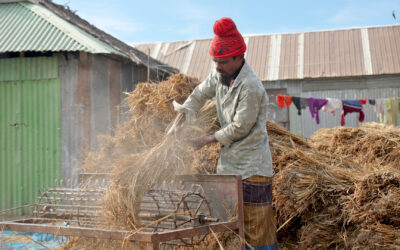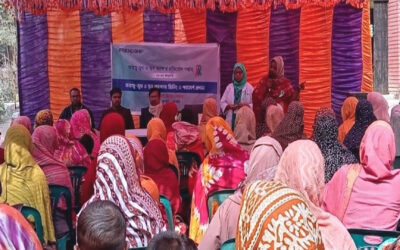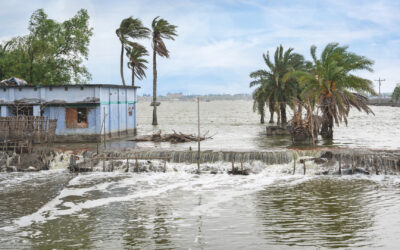Shahazadi Akter, Friendship Flood Volunteer, relates her experiences visiting CBA18
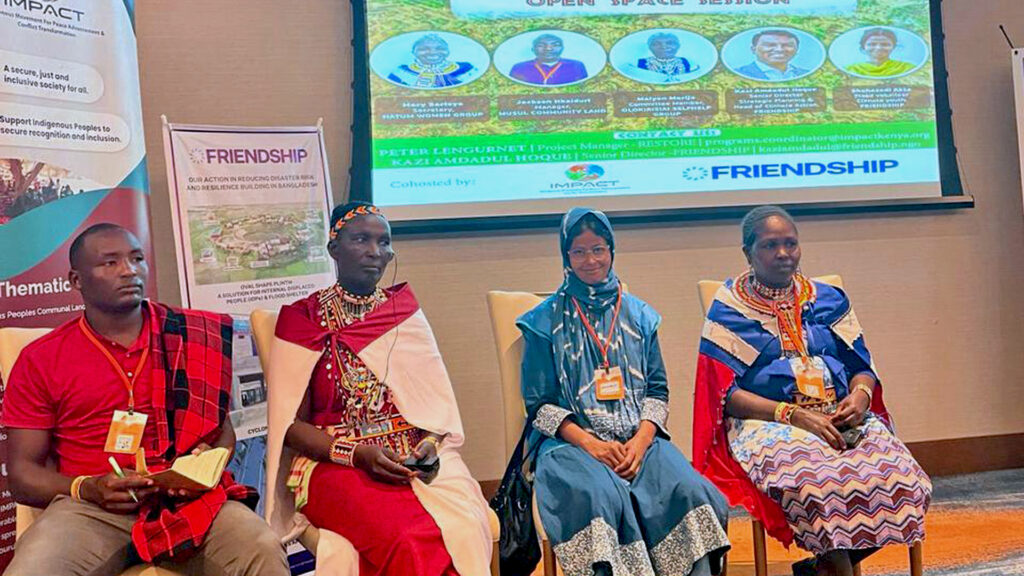
by Iqra Qamari
May 26, 2024
For residents who are far removed from the realities of many climate-vulnerable communities, it is hard to relate to the harrowing experiences that char dwellers regularly have to undergo. We listen to their stories with a hand on our mouths and sympathy in our hearts, but the truth of the matter is, that we will never truly walk in their shoes. What we can do, however, is be inspired by individuals like Shahazadi Akter, a climate youth and flood volunteer. Hailing from Bojra Char in Gaibandha, this young and vibrant woman did not let her narrative be narrowed to just her story of survival. She added chapters through her own self-agency, fighting back against her circumstances, culminating in helping others survive. She then went on to inspire an international audience with her experiences, at CBA18.
Shahazadi Akter, 27 years old, was invited to speak at the 18th International Conference on Community-Based Adaptation to Climate Change (CBA18) in Arusha, Tanzania, held from May 6-9, 2024, along with a delegation from Friendship. Nestled at the foot of the majestic Mount Meru of Tanzania, the raw beauty of Arusha stretched for miles in front of Shahazadi leaving her in awe. Despite never having even been to her own nation’s capital, Shahazadi was able to find her footing in this remarkable gathering of dedicated experts committed to addressing climate change through local action and community engagement. As the delegates eagerly participated, sharing insights, and forging impactful collaborations, Shahazadi stood out, representing her community and fellow volunteers, sharing her hands-on experiences and the impacts of climate change.
Friendship and IMPACT Kenya jointly organized an open space session, titled “Shifting Power: Community-Led Climate Finance in Practice; Experiences from Kenya and Bangladesh”, which provided a platform for community leaders to share their experiences. Another dynamic session on “Youth Engagement in Climate Action”, was co-hosted by Friendship and Save The Children, which underscored the vital role of youth in shaping a sustainable future with young climate practitioners from the frontlines driving change within their communities. With great anticipation and understandable anxiety, Shahazadi not only narrated her story but wore her heart on her sleeve. After hearing her story, people cheered and encouraged her, because they could feel the emotion and because no other similar experienced story could be heard during the conference.
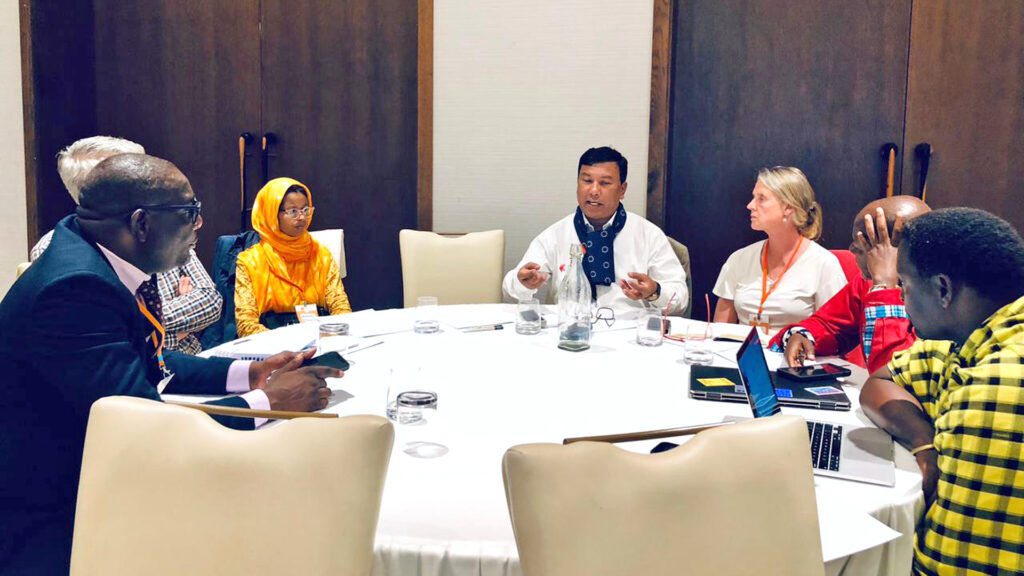
Shahazadi’s story starts with her fondly remembered childhood in Gaibandha, which was then safe from the threat of erosion for years. But in 2010, the char was inundated, tearing her home apart, and scattering a joint family. Too young to grasp the magnitude of the tragedy, she saw it as an adventure–a boat journey to her grandmother’s. Nearly a decade later, a flood of similar ferocity came back to haunt her–this time, snatching her beloved uncle. He had ventured into the waters, desperate to save their cattle from starving, often the only income-generating asset these communities possess. Tragically, he never returned and by evening, they had found his dead body. Shahazadi, shattered by grief, regretted the absence of aid that could have saved her uncle’s life. At this point, her voice quivered and tears streamed down her face. However, her story does not warrant sympathy, it warrants respect. Shahazadi spoke of the resolve that she had found afterwards. A resolve that made her embrace a new purpose – of becoming a flood volunteer to protect her community from the ravages of nature.
Flood volunteers like Shahzadi demonstrate a deep connection with nature, developing local solutions to challenges that often leave policymakers and local agencies scratching their heads. The community-driven innovations, born from necessity and nature’s guidance, reveal a reliance on self-sufficiency due to limited external support during floods. Cut off from communication due to prolonged power cuts, they resort to simple yet effective methods like using yardsticks to measure water levels and putting anklets with chimes on children to ensure that they never stray too far when the water edges near the porch. Despite the challenges, flood volunteers mobilise quickly, prioritising vulnerable individuals, taking them to higher grounds such as a school or madrasa used as flood shelters, and providing aid such as food, medicine, and repairs to damaged homes. With floods disrupting daily life for weeks, these volunteers working without compensation become the lifeline for communities navigating through adversity. In 2023, when she got associated with Friendship, Shahazadi became a flood volunteer in Kurigram.
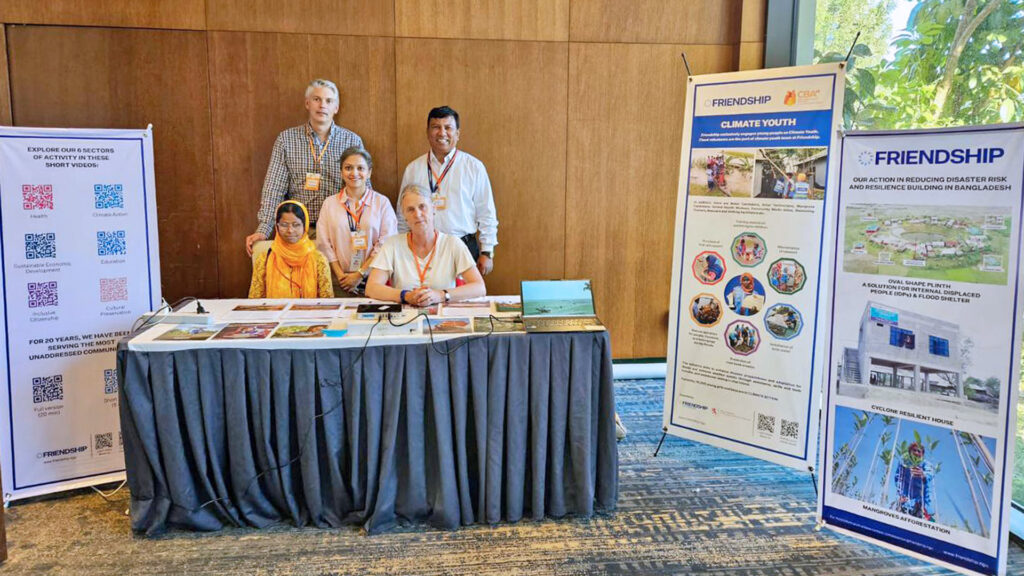
Shahzadi was very touched by the warmth and hospitality of the Tanzanian people, as locals eagerly shared their traditions and stories, creating an atmosphere of mutual respect and learning. Through all the cultural exchange, it was as if her world had just expanded. The field visits to Selela and Makuwini villages close to Arusha offered her and the rest of the delegates firsthand insights into their land restoration, water harvesting, and microfinance projects. Interactions with the Maasai community highlighted the tangible impacts of these initiatives. Shahzadi believes that these villages will develop very quickly going into the future, as she believes they are at one with nature, from which the Bangladeshi community has a lot to learn from.
However, at events like CBA, one thing becomes increasingly evident–Bangladesh is not just the epicentre for climate disasters but is also a powerhouse for locally-led climate solutions that emerge from indigenous knowledge and practices like that of Shahazadi’s. As CBA18 concluded, there was a sense of hope and accomplishment. She felt proud speaking to a global audience, despite language barriers. Sitting in the marketplace, she interacted with visitors, recounting the natural disasters in her area and her role in mitigating their impacts through Friendship’s support.
Going back home, Shahazadi is excited to share her experiences within her community, emphasising on locally-led adaptations. She believes in the resilience of her people and aims to inspire her fellow flood volunteers and other climate youth. It is frontline climate fighters like Shahazadi who need to have their voices heard to inspire other young people from climate-affected communities to keep the challenging future in their own hands.

